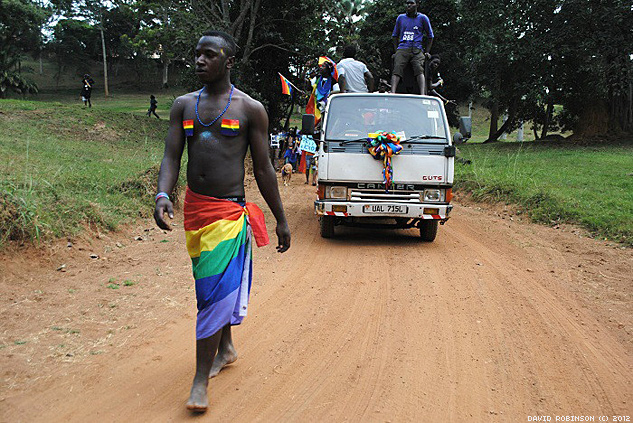
In a recent article in the New York Times here, it is alleged that Ugandan tabloid newspaper Red Pepper infringed the copyright of Denver David Robinson, the photographer behind the photographic project titled: “We Are Here: LGBTI in Uganda” which was published by The Advocate, an American L.G.B.T. magazine here.
From an intellectual property (IP) perspective, this blogger aims to discuss Robinson’s claim against Red Pepper and the extent to which the provisions of fair use under Ugandan copyright law would be applicable. In addition, this blogger will also consider the moral rights issues that may arise in this case.
Robinson, a gay man, explains that his photo essay of the LGBTI community in Uganda was a result of his stay in the East African country in 2012. His work featured the photographs of a dozen members of the community who told their stories. Although The Advocate has taken down Robinson’s work from its site, some of Robinson’s photographs can be viewed on the GLAAD site here.
On February 24, 2014, Ugandan President Yoweri Museveni signed Uganda’s Anti-Homosexuality Bill into law. This Bill was first introduced in 2009 by David Bahati, a Member of Parliament, with the intention of criminalising same-sex relations whereby a person considered as homosexual would receive the death penalty, or life imprisonment.
Robinson alleges that following this presidential assent, Red Pepper ran a series of stories aimed at “outing” LGBTI persons in Uganda and that these stories all used his photographs from The Advocate publication. He explains it thus:
The Red Pepper, published an article titled “Homosexuality Could Cause Mental Illness — Medics.” One of the photographs accompanying the article was one — also published by The Advocate — that I had taken at Uganda’s very first pride parade in 2012, showing two Ugandans with broad smiles. The Red Pepper had not contacted me or sought my permission.
On many days since, similar stories and photographs have been published. The worst for me and my activist friends came on Feb. 28, when the Red Pepper reprinted — again, without permission — a version of my photo essay for The Advocate. The feature was retitled “Top Ugandan Gays Speak Out: How We Became Homos.”
With regard to the copyrightability of Robinson’s photo essay, Uganda’s Copyright and Neighbouring Rights Act, 2006 is identical to Kenya Copyright Act, 2001. Both Acts provide that Robinson’s work is eligible for copyright as both an artistic and a literary work.
The next step for Robinson is to establish that there is an objective similarity between his original work and the work published by Red Pepper. In this regard, Robinson says:
“Although the Ugandan participants and I knew that the photos and stories might someday be used against us, we never thought the entire project would be stolen wholesale.”
This wholesale theft alleged by Robinson would sufficiently be proved by a side-by-side comparison between the photographs published by tabloid and those taken by Robinson for publication in The Advocate.
The final leg in Robinson’s copyright infringement suit will be to show that there is a causal connection between his original work and Red Pepper’s infringing copy. This causal connection would be established by showing that his work was accessed from The Advocate, a publication made available online since February 2013.
In reply to Robinson’s claim, Red Pepper may decide to challenge the photographer’s locus standi (legal standing) to bring this copyright suit. This is because the original work copied was by The Advocate, which is a separate entity from Robinson. In this connection, it is clear that the infringement is confined to the economic rights contained in sections 9(a) and (f). Therefore it would be important to interrogate the nature of the relationship between Robinson and The Advocate to determine who has the locus standi to bring a suit for copyright infringement of the economic rights. However, it is clear that Robinson would have locus standi to bring a copyright infringement suit with respect to his moral rights to claim authorship of the work and object to any distortion, mutilation, alteration or modification of the work as provided under sections 10(1)(a) and (c) of the Ugandan Act.
However, Red Pepper may be able to counter Robinson’s copyright infringement claim by relying on the defence of “fair use” as provided under section 15 of the Ugandan Copyright Act. This defence appears to be an option for Red Pepper due to the following remarks made by Robinson:
I had been given a byline as if I were one of the newspaper’s reporters. Some words were changed, and the photographs were cropped to cut out my copyright watermark. The Advocate was neither contacted nor credited.
Like Kenya’s Act, Uganda’s Act contains several general exceptions and limitations to the exclusive rights granted to copyright owners. It follows that whatever falls within the exceptions and limitations constitutes lawful conduct and therefore liability for infringement would be excluded. With specific reference to the present case, section 15(1)(e) states as follows:
The fair use of a protected work in its original language or in a translation shall not be an infringement of the right of the author and shall not require the consent of the owner of the copyright where the work is reproduced, broadcast or communicated to the public with acknowledgement of the work, in any article printed in a news paper, periodical or work broadcast on current economic, social, political or religious topic unless the article or work expressly prohibits its reproduction, broadcast or communication to the public;
In this regard, it is not disputed that Red Pepper used the photographs in the reporting of current events however the question for the court to determine is whether the author of the work was acknowledged as such. It is clear that this determination will entail a discussion of what would objectively amount to acknowledgement under the Ugandan Copyright Act.
This blogger will be keenly following the developments in this case as it proceeds to court.